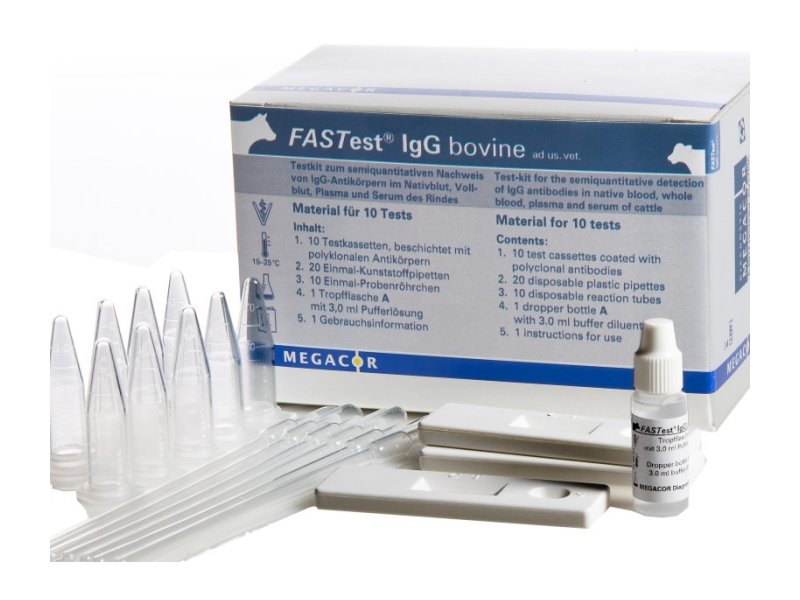Description
IgG Immune Screening For The Determination Of The Health Status Of Calves & Cattle
Test applicable to: Calves and Cows
Sample: Whole blood, Plasma or Serum
FASTest IgG Bovine is based on an immunochromatographic “lateral flow” test for Bovine IgG antibodies in the sample. This enables the veterinarian on-farm and without any technical costs to confirm a suspicion of failure of passive transfer (FPT) or immune deficiency syndrome (IDS) in the cow as well as the calf.
Cow and Calf’s Immunity
The cow and calf’s immunity can be determined optimally during the peripartum period and this can help to reduce calf losses.
What is Immunoglobulin G?
Immunoglobulin G (IgG) is an antibody isotype. It is made up of a protein complex which is composed of four peptide chains, two of which are identical heavy chains and two identical light chains which are arranged in a Y shape. Every IgG will have two antigen binding sites.
FASTest IgG Bovine Product Information – PDF Download
Why Test?
Why is it important to test for Immunoglobulin G (IgG)?
An animal’s immune system will protect the animal’s body from invasion of various pathogens (antigens). The formation of blood soluble antibodies (immune globulins) is part of the way the body protects itself. The immune globulins G (IgG, gamma globulins) are part of the antibody class G and are mainly directed against viruses and bacteria.
For effective immunity, optimal levels of immunoglobulins (IgG particularly IgG1) are needed. This guarantees optimal breeding success especially in the peripartal stage and in newborn calves as this is of importance to the livestock industry.
Symptoms
What are the symptoms of Immunoglobulin G Bovine?
Newborn calves often show hardly any or no Immunoglobulin G due to the special placenta conditions before birth. The most important base for an immunoprophylaxis is the adequate supplementation of IgG.
How is Immunoglobulin G transferred?
Immunoglobulin G is transferred by the ingestion and resorption of colostrum directly after birth and up to 24 hours later.
Any failure of passive transfer or FPT may be caused by:
- Inadequate suckling (reduces vitality, neonatal respiratory depression a.s.o.)
- Colostrum application
- Low levels of IgG in the colostrum
- Inadequate absorption of IgG
- Environmental Stress
Consequences of an immune deficiency syndrome or IDS may result in weak calves – they have a high vulnerability for infectious newborn diseases which can include:
- Enzootic pneumonia
- Diarrhoea including calf scours
- Septicaemia diseases


